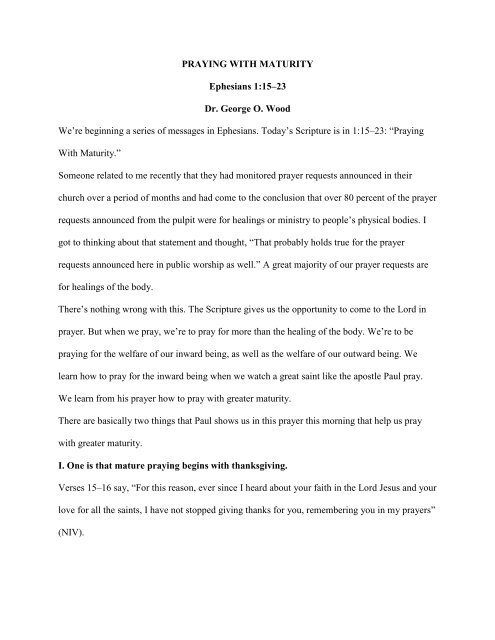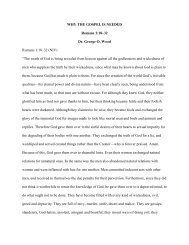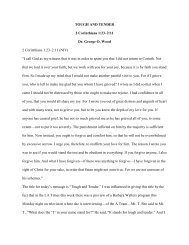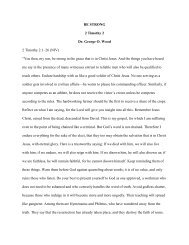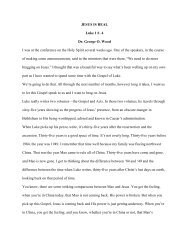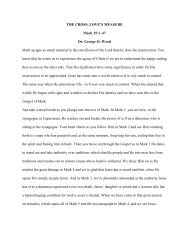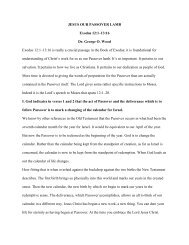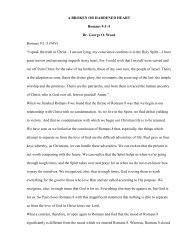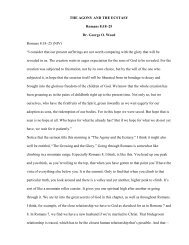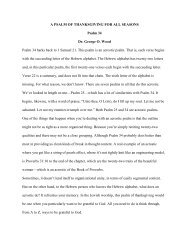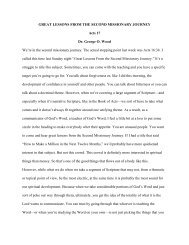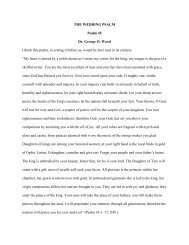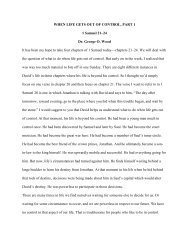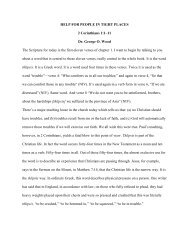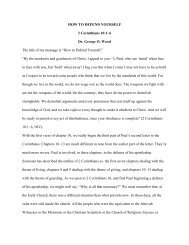02 PRAYING WITH MATURITY.pdf - Dr. George O. Wood
02 PRAYING WITH MATURITY.pdf - Dr. George O. Wood
02 PRAYING WITH MATURITY.pdf - Dr. George O. Wood
Create successful ePaper yourself
Turn your PDF publications into a flip-book with our unique Google optimized e-Paper software.
<strong>PRAYING</strong> <strong>WITH</strong> <strong>MATURITY</strong><br />
Ephesians 1:15–23<br />
<strong>Dr</strong>. <strong>George</strong> O. <strong>Wood</strong><br />
We‘re beginning a series of messages in Ephesians. Today‘s Scripture is in 1:15–23: ―Praying<br />
With Maturity.‖<br />
Someone related to me recently that they had monitored prayer requests announced in their<br />
church over a period of months and had come to the conclusion that over 80 percent of the prayer<br />
requests announced from the pulpit were for healings or ministry to people‘s physical bodies. I<br />
got to thinking about that statement and thought, ―That probably holds true for the prayer<br />
requests announced here in public worship as well.‖ A great majority of our prayer requests are<br />
for healings of the body.<br />
There‘s nothing wrong with this. The Scripture gives us the opportunity to come to the Lord in<br />
prayer. But when we pray, we‘re to pray for more than the healing of the body. We‘re to be<br />
praying for the welfare of our inward being, as well as the welfare of our outward being. We<br />
learn how to pray for the inward being when we watch a great saint like the apostle Paul pray.<br />
We learn from his prayer how to pray with greater maturity.<br />
There are basically two things that Paul shows us in this prayer this morning that help us pray<br />
with greater maturity.<br />
I. One is that mature praying begins with thanksgiving.<br />
Verses 15–16 say, ―For this reason, ever since I heard about your faith in the Lord Jesus and your<br />
love for all the saints, I have not stopped giving thanks for you, remembering you in my prayers‖<br />
(NIV).
<strong>PRAYING</strong> <strong>WITH</strong> <strong>MATURITY</strong><br />
Ephesians 1:15–23<br />
In my home church in Springfield, Missouri, the pastor called on Reverend C. M. Ward to lead<br />
in prayer. He, at that time, was speaker for ―Revival Time.‖ What was unusual for the call for<br />
him to pray was that Ward was not on the platform. Normally, when someone leads in prayer,<br />
they‘re on the platform, because the auditorium is so big you practically had to have a mic to be<br />
heard. As soon as Ward began to lead, he began in a voice loud enough that it could be heard<br />
through the rafters. He said something like this, ―O God, we are here this morning to complain.‖<br />
I‘d never before in my life heard anyone begin a pray that way. And, of course, what he was<br />
complaining about was the prayer requests. I thought it was a rather unique way to say ―prayer<br />
requests.‖<br />
As I reflected upon that, I wondered if—perhaps more subtly—our prayers aren‘t couched in a<br />
form of complaint to God. It‘s striking when we turn to Paul‘s praying, that we should find,<br />
instead of complaints, thanksgiving. Out of the thirteen letters that Paul writes, six of them have,<br />
in their first chapter, a prayer of thanks. And not just a general thanksgiving for God and<br />
salvation, but a specific thanksgiving for the people that have been associated with Paul. Maybe<br />
a way to pray maturely—in respect to thanksgiving—is to single out, for thanksgiving to God,<br />
the people in our life that have touched us the deepest: our spouses, if we have them; our<br />
children; our parents; our brothers and our sisters; our church family; our deepest friends.<br />
Am I praying to the Lord for the people in my life And do I let them know that I thank God for<br />
them<br />
Paul gave specific reasons for thankfulness.<br />
A. Their faith in the Lord and their love for all the saints. When you look at Paul‘s situation at<br />
the time of the writing, perhaps you could find an excuse for his not being thankful. He was,<br />
after all, in prison. He was awaiting trial. A church like at Philippi had sent him an offering to<br />
2
<strong>PRAYING</strong> <strong>WITH</strong> <strong>MATURITY</strong><br />
Ephesians 1:15–23<br />
help him at this time. But the Ephesian church hadn‘t sent him an offering. Maybe that could<br />
have been the basis for a complaint.<br />
B. And two, when you read Ephesians 4 and 5 and see the practical pastoral instructions that<br />
Paul gives the church, you can immediate detect that not everybody in this church was perfect.<br />
There was a lot of room for improvement of their spiritual walk. There were also problems in<br />
relationships: husband/wife problems; parent/child problems; employer/employee problems. Yet<br />
before dealing with any one of those, Paul lets us know that the way to relay prayer effectively is<br />
to begin with thanksgiving in your heart. Otherwise, if you try to correct people without<br />
thanksgiving, you will correct them with the wrong kind of spirit and it will not produce any<br />
change at all.<br />
Why do we neglect thanksgiving in our life Sometimes, it‘s just a matter of plain carelessness<br />
or complacency. We‘re perhaps like the wife who complained that her husband never said, ―I<br />
love you.‖ His response was, ―I don‘t need to. I bring the paycheck home every time, don‘t I‖<br />
That was his way of saying, ―I love you.‖ She wanted to hear it. Some of you wives would like<br />
to hear it from your husbands as well.<br />
We neglect to say things like ―I love you‖ or ―Thanks‖ because we become complacent.<br />
Sometimes, we don‘t express thanksgiving to God because there is sin in our life and nothing<br />
will keep us from prayer like sin. But, rather than letting sin keep us from prayer, it should be<br />
what drives us to prayer, because we recognize that God has His arms extended wide to receive<br />
us, and that we can be healed, only by coming to Him in prayer.<br />
Often broken fellowship keeps us from being thankful to the Lord. I realize that, from time to<br />
time, there are married couples that come to a Sunday morning service and have hardly been on<br />
speaking terms with one another. Yet, out of a sense of duty and habit, they come to worship the<br />
3
<strong>PRAYING</strong> <strong>WITH</strong> <strong>MATURITY</strong><br />
Ephesians 1:15–23<br />
Lord. The Lord wants you, at this time, as you hear this message, even today, to reflect upon<br />
your relationship with your spouse and, in the quiet of your heart, to give thanks to God for<br />
them, no matter how broken you might feel your relationship to the one you have loved is. By<br />
thanksgiving, a door is created through which God can begin the healing process.<br />
Sometimes, bitterness keeps us from being thankful to the Lord. Situations have happened in our<br />
lives about which we are not content. We feel like Asaph, in Psalm 73, who said, ―When my<br />
heart was grieved and my spirit embittered, I was senseless and ignorant. I was like a brute beast<br />
before You.‖ Bitterness can make us behave like animals at times. But the Lord wants to wash<br />
that away with thanksgiving. So if you want to begin to pray maturely, begin with thanksgiving.<br />
II. The second major thing that Paul says about mature praying—in giving us his own<br />
example of prayer—is that mature praying is more concerned with petitioning God for<br />
inward personal change than petitioning God for simply the outward change of<br />
circumstances.<br />
Probably, if a poll was taken of each one of us here this morning, we could all think of things in<br />
our life that we would like to change. It might be our health. It might be our job. It might be<br />
some of the breaks we wanted to go our way. It might be somebody we‘re linked up with. It<br />
might be the classes we‘re attending. Something we‘d like to change in our circumstances.<br />
Often, our prayers are simply coming to God, asking Him to change our circumstances. But<br />
mature praying, as it‘s reflected in the Lord‘s prayer and in Paul‘s prayers, are prayers that have<br />
to do with changing us inside—that God has a freer hand in working on the inside of us. Many<br />
times, He wants us to live with a circumstance in order for something on the inside of us to<br />
change. When we look at the Lord‘s Prayer, five out of the six petitions don‘t have anything to<br />
do with outward change. They have to do with inward change. Paul prays for some things that<br />
4
<strong>PRAYING</strong> <strong>WITH</strong> <strong>MATURITY</strong><br />
Ephesians 1:15–23<br />
have to do with that Ephesians, that have to do with inward change and reflect great maturity and<br />
prayer.<br />
A. The first thing he prays for, by way of inward change, is so that we all might know God<br />
better. Verse 17 says, ―I keep asking that the God of our Lord Jesus Christ, the glorious Father,<br />
might give you the Spirit of wisdom and revelation, so that you may know him better‖ (NIV).<br />
Paul is not praying that we would know more about God. That can be important, and there is<br />
room to grow theologically and doctrinally. But more important than knowing about God is<br />
knowing God himself.<br />
An older minister friend of mine made a statement in a personal conversation not many weeks<br />
ago. He was alarmed about the amount of people that were in pulpit and music ministry today<br />
who were turning up with moral sin in their lives. He made this comment, ―I have seen it to be<br />
true that a man can preach great sermons and still have sin in his life. I‘ve also found it to be true<br />
that a person can have a great ministry in music and still have sin in their life. But I have yet to<br />
find someone who really consistently prays, who has that kind of sin in their life.‖<br />
That, I think, is what Paul means when he says he‘s praying that we‘ll know God better.<br />
Because, when we know the character and nature of God better, our own lives are purified and<br />
made whole. Paul prays for the kind of knowledge that is not a partial knowledge but a full<br />
knowledge. In the Greek language, in which Paul writes, the common word for knowledge is<br />
gnosis. He prayed that they would have epignosis, which is ―full knowledge.‖ It means the kind<br />
of knowledge that involves, on our part, a greater participation in what is known. Because we<br />
have a greater participation in what is known, it has a greater effect upon our conduct.<br />
So when we really come to know God in the fullest sense, we become more active in His ways<br />
and we become more influenced by Him. We need the Spirit of wisdom and the Spirit of<br />
5
<strong>PRAYING</strong> <strong>WITH</strong> <strong>MATURITY</strong><br />
Ephesians 1:15–23<br />
revelation. ―Wisdom‖ is the mind of Christ which comes to us in a particular situation and helps<br />
us know how God would respond to that situation. ―Revelation‖ is some secret disclosure of<br />
God‘s mind, that we may not have previous access to, but when we‘re needing it, the Spirit of<br />
revelation is there to show us how God would face what we‘re facing. Saint Paul fears the<br />
congregation knows God too little, and therefore does not know how Jesus would respond in life<br />
situations.<br />
It‘s interesting to look at how Paul deals with this concept and knowledge, because he admits, in<br />
Romans 7, that there are times when we do not know ourselves. He admits, in Romans 8, that<br />
there are times when we do not know our circumstances. But, he says, there really is never a time<br />
when we do not know God. We may not know ourselves. We may not understand our<br />
circumstances, but we may always know God.<br />
There is no time in our life when we can be absent from the phrase ―We have the mind of<br />
Christ.‖ Friends, when we‘re praying and knowing God, we have the mind of Christ.<br />
B. The second petition that Paul makes is that we know the hope to which we are called. Verse<br />
18 says, ―I pray also that the eyes of your heart [isn‘t that a beautiful phrase—poetic—‗the eyes<br />
of your heart‘] may be enlightened in order that you may know the hope to which he has called<br />
you, the riches of his glorious inheritance in the saints‖ (NIV). I know that there are different<br />
hopes represented in this congregation. Some of you are hoping that you‘ll survive school this<br />
year. Some of you are hoping to get a college degree or a high school degree. Some of you are<br />
hoping that someday you‘ll be able to buy your own home instead of renting. Others of you are<br />
hoping that you‘ll be able to get a better home than the one you now own. Others are hoping that<br />
you‘ll find a job that is more meaningful than the one that you occupy now.<br />
6
<strong>PRAYING</strong> <strong>WITH</strong> <strong>MATURITY</strong><br />
Ephesians 1:15–23<br />
These hopes are all important. But there‘s a hope that is more important. That is deeper. That is<br />
eternal. And it is the hope of our glorious inheritance in Christ Jesus. It surpasses any hope that<br />
we have. From time to time, we need to realize that this world is not our home, we‘re just<br />
passing through. We have a hope laid up for us, which is fixed and sure.<br />
When we come to cross the chasm that separates this world from His, there‘s someone that‘s<br />
going to meet us on the bridge. And He‘s bringing His own light. You have this hope in you and<br />
Paul‘s prayer is that, in the midst of all of our temporal day-to-day problems, we will be focusing<br />
on the hope of our glorious riches in Christ. The Christian knows which is better. To be absent<br />
from the body is to be present with the Lord.<br />
C. The third thing that Paul directs us to pray for, regarding maturity, is that we might know the<br />
incomparable power of God toward us (verses 19–23). That we might know ―His incomparably<br />
great power for us who believe. That power is like the working of his mighty strength, which he<br />
exerted in Christ when he raised him from the dead and seated him at his right hand in the<br />
heavenly realms, far above all rule and authority, power and dominion, and every title that can be<br />
given, not only in the present age but also in the one to come. And God placed all things under<br />
his feet and appointed him to be head over everything for the church, which is his body, the<br />
fullness of him who fills everything in every way‖ (Ephesians 1:19–23, NIV).<br />
As a young person, I remember seeing at a fair a game in which you had a big mallet and you hit<br />
something that was a scale, and it would shoot something up in the air that measured how strong<br />
you were. If you rung the bell at the top, it indicated you were a strong man and you would get a<br />
prize.<br />
When you think of a unit of strength, when you look at the Old Testament, the thing that rings<br />
the bell of God‘s power in the Old Testament, that there‘s never anything equal to it, is the<br />
7
<strong>PRAYING</strong> <strong>WITH</strong> <strong>MATURITY</strong><br />
Ephesians 1:15–23<br />
exodus of God‘s children from Egypt. All throughout the Old Testament, the exodus is the unit<br />
of measurement of God‘s strength.<br />
But in the New Testament, there is a whole different thing brought into focus. The unit of<br />
measurement in the New Testament, the mallet of God‘s power, is the resurrection of Jesus<br />
Christ from the dead. Nothing comes even close to measuring God‘s power, not even the<br />
splitting of the atom. Nothing comes close. The resurrection of Jesus Christ is the indication of<br />
how great God is. Paul says that this same power that is at work in Christ is also at work in us.<br />
It‘s like saying that the water in the ocean, that supports the greatest ocean tanker, is the same<br />
water that keeps our canoe afloat. The same power that raised God‘s Son from the dead is the<br />
power that also is at work in us, for the glorification of our bodies.<br />
What Saint Paul is saying is, ―We realize that, while scientists are trying to create life in test<br />
tubes, Christ already—through His resurrection—got a hold of humanity. He is Lord over all. He<br />
is head of the church.‖ Yet Paul says this one strange thing about Christ and His power: ―The<br />
church…is his body, the fullness of him who fills everything in every way‖ (Ephesians 1:22-23,<br />
NIV). Here is an eloquent phrase which describes our relationship with Christ. We are His<br />
fullness. In other words, Christ is not full without us. Although He fills everything in every way,<br />
He is not full without us.<br />
What does this mean It simply can be compared to the fact that, although a physician may be a<br />
great physician, he cannot practice being a physician unless he has patients to work with. And<br />
although Christ is Redeemer and Savior, He yet cannot practice that redemption and that saving<br />
unless there are people whom He redeems and whom He saves. And, in the eternal counsel of<br />
God, it has pleased God that Christ should remain incomplete without us. We are His body. And<br />
we also become a reflection of the measure of His power.<br />
8
<strong>PRAYING</strong> <strong>WITH</strong> <strong>MATURITY</strong><br />
Ephesians 1:15–23<br />
So, Saint Paul directs our attention to these things, that in our praying, we might be changed on<br />
the inside. That we might pray with thanksgiving, and that we might pray that our inward<br />
attitudes expand, so that we have no small view of Christ, no small view of ourselves. But rather,<br />
that we know God. That we have a glorious home. That we have the greatness of God‘s power.<br />
Closing Prayer<br />
Father, we thank You for this Sunday in which we have come to worship You. I pray now, Lord,<br />
as we apply this message to our lives, to the various needs that are represented—some of which<br />
Your Spirit has indicated in my own heart and some of which are known alone to the hearts of<br />
people who are here. There are persons here this morning, Lord, who really need an experience<br />
to withdraw from the bitterness and the isolation and the sins of their lives, and begin to thank<br />
You for redeeming them and for the family and the friends You‘ve put them with. God, let<br />
thanksgiving rise in our hearts, as a fountain bursting out of the desert floor. Let the spirit of<br />
thanksgiving come upon us. Lord, there are others here who have spent a great deal of time<br />
praying for the changing of circumstances, and it may very well be Your will that those<br />
circumstances change. Yet Lord, more important than the change of circumstances are the<br />
changed people You want us to be in them. We pray, Lord, to grow in the knowledge of You.<br />
We pray, Lord, that we would again know in our hearts the greatness of our home. That, in the<br />
times when life brings us the worst, when we are wounded and harried and our tears flow, that<br />
we‘ll remember this world is not our final home. And that our hope in You is not some pie in the<br />
sky. But it‘s reality, grounded in who You are. That for You not to deliver on your promise is<br />
totally unthinkable. And that every moment we have spent here in agony and suffering and<br />
sorrow will be replaced by an eternal eon of joy in Your presence. Help us, Lord, to understand<br />
that not everything is measured here; but that the weight of glory is so much greater than the<br />
9
<strong>PRAYING</strong> <strong>WITH</strong> <strong>MATURITY</strong><br />
Ephesians 1:15–23<br />
weight of agony and suffering. Let us have hope and not let the world steal it from us. Teach us,<br />
Lord, to trust in Your power again. To realize, Lord, that there is not a thing in life that You<br />
don‘t have power over. That You have power in heaven and on earth and under the earth and all<br />
things are Yours. We rejoice that we are the body of Christ, sons and daughters of God, joint<br />
heirs with Christ. We praise Your name for who we are. Bless Your people today, we pray. In<br />
the name of Jesus our Lord. Amen.<br />
10


